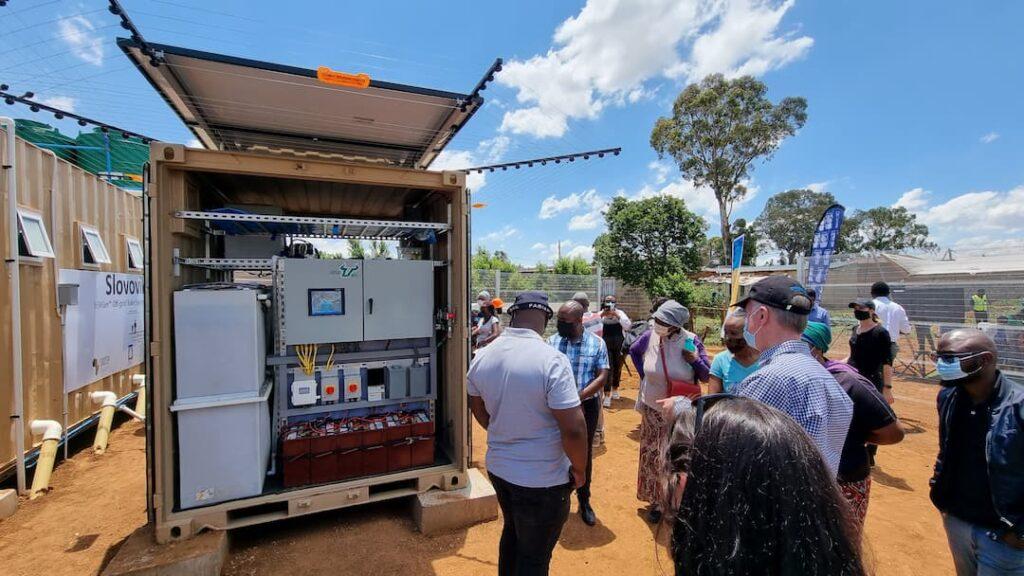Local water and wastewater treatment contractor WEC Projects has secured its first commercial order for the NEWgenerator sanitation system for a school in the Eastern Cape, after piloting the system in eThekwini and in Soweto.
The system is set to be installed at the Khanyisani Primary School in Lubunde, near Bizana, in the Eastern Cape.
AdvertisementThe installation of the unit is expected to be completed by the end of April 2022 and WEC Projects will provide an additional 18 months of technical support which will allow the company to monitor and maintain the system as necessary.
Last year, WEC Projects was selected by the Water Research Commission (WRC), under the South African Sanitation Technology Enterprise Programme (Sastep), to test the new off-grid sanitation system with the intention of commercialising it in South Africa.
AdvertisementThe NEWgenerator, which was developed by the University of South Florida (USF) and built under licence in South Africa by WEC Projects, is designed to turn sewage wastewater into clean water, energy and nutrients, providing water for reuse as toilet flushing water, as well as biogas-based energy and nutrient-rich fertiliser.
The provision of proper sewage treatment for use in areas where infrastructure is lacking makes it ideal for communities which rely on conventional solutions such as pit or portable toilets.
As an industrial manufacturing partner, WEC Projects is commercialising and deploying the technology to rural and informal communities across South Africa.
“The system, based on the NEWgenerator 100 model which is capable of handling waste from up to 100 users, will be installed at the Khanyisani Primary School in Lubunde, near Bizana, in the Eastern Cape.
“The school, located in a rural area, lacks a consistent water supply,” said WEC Projects process engineering manager Tim Fisher.
While the recycled water produced will not be treated to human consumption standards, it will be suitable for reuse in the toilets.
“The NEWgenerator system will not only treat the sewage produced by the school’s toilet block but the treated water produced by the sanitation process will be recycled back to the toilet block for reuse, ensuring a consistent water supply.”

Further, the biogas produced by the sewage treatment process will potentially be used by the school for cooking and heating purposes, resulting in a reduction in its power consumption.
The system is a compact, portable and modular sewage treatment technology incorporating an anaerobic digester that uses microbes to break down human waste while producing biogas.
Clean water is filtered out, with bacteria, viruses and any remaining solid particles removed, and then disinfected through a chlorination system, while 99% of the water can be recycled for reuse in the sanitation platform, reducing its reliance on the local water supply.
The nutrient-rich treated water can be used as crop fertiliser by local small-scale and informal farmers and the biogas produced can be used for domestic purposes, such as cooking and heating.
Meanwhile, WEC Projects is using the contract as an opportunity to optimise the design of the NEWgenerator unit for local conditions.
The company plans to build the NEWgenerator into a larger shipping container to allow more space for equipment and operational staff, while incorporating the unit into the school’s existing toilet block and providing the infrastructure for reticulating the biogas.
“This is a particularly exciting project for us as it is the first commercial installation of the NEWgenerator system in South Africa,” Fisher said.
Previously, the system was deployed on a pilot project basis in the country, first in eThekwini, in conjunction with the University of KwaZulu-Natal, and then on a larger scale in Soweto, in projects that were overseen by the WRC’s Sastep programme, which selected WEC Projects as its commercialisation partner to manufacture NEWgenerator units in South Africa under licence to USF.
“By manufacturing the units locally and, where possible, using local components, we will be able to build units more rapidly while reducing the overall cost. Local production also means that the cost of shipping will be reduced considerably, making them ideal for market conditions throughout the Southern African Development Community region,” he added.
In addition, NEWgenerator offers employment and franchisable economic opportunities for local small businesses and entrepreneurs who can provide not only sales, installation and maintenance of the units to the surrounding communities, but also training and upskilling for the youth.
“Its flexibility in design and installation also makes it ideal for use in applications such as tourism, and industries such as mining, creating a catalyst for new business development and expanding the scope for both direct and indirect job creation, particularly in areas marred by high unemployment and low economic growth.”
It can also address the ongoing challenge of food security for rural communities with its nutrient-rich solid waste and, as an inexpensive fertiliser, it can help emerging small farmers optimise crop yields for local consumption as well as enable them to on-sell surplus produce to local retailers, he concluded.
The project will be funded by through the WRC’s Sastep programme.
